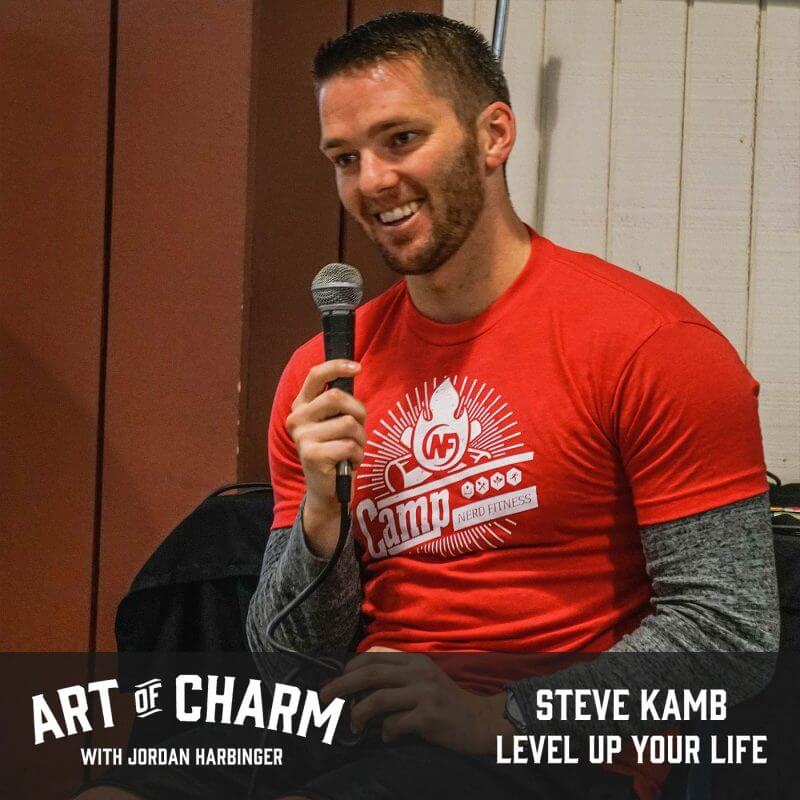Steve Kamb (@stevekamb) gives us a blueprint to follow, based on game mechanics and nerd culture, to finally accomplish things in our lives we’ve always wanted but never found the time for in his first book, Level Up Your Life.
The Cheat Sheet:
- Stuck in a rut? Need to get in shape and add more adventure to your life? Take your own hero’s journey and stop letting fictional characters have all the fun.
- What is The Progress Principle, and how does it help us stay motivated in pursuit of larger goals?
- How can you ensure you’ll return to your hero’s journey when you occasionally falter (as most mere mortals do from time to time)?
- Life is a multiplayer game.
- Learn how to identify and quantify your fear, and then take action and use that fear to succeed.
- And so much more…
[aoc-subscribe]
Everyday life can seem like such a grind. During the course of a typical, mundane week, a lot of us sit and wait and hope for excitement instead of taking action. That week becomes months, months become years, and decades become a deathbed. It’s not uncommon to find ourselves seeking an escape from this monotony in movies, books, and games — but what if, instead of living vicariously through fictional heroes to give us solace from our problems, we could fulfill our own storylines and become the heroes?
In episode 477 of The Art of Charm, we talk to Steve Kamb, founder of NerdFitness.com and author of Level Up Your Life. He’s here to tell us how we can use the principles of gamification to turn everyday goals into quests that reward us for getting healthier and checking off the items on our bucket lists long before our expiration dates. Listen in, take the hero’s journey, and start earning the experience points that will level up your life today — onward to adventure!
More About This Show
Steve Kamb tells us he spent the first half of his twenties drinking in bars, playing video games, being afraid to talk to women, going to a job he didn’t like, and just kind of drifting. He grew up as the guy who daydreamed but never did anything to pursue those dreams. He was risk averse, a picky eater, and a shy nerd. He buried his face in books, games, and movies, vicariously living adventures through the heroes of those stories instead of improving himself and living his own storyline.
Since then, he’s put a system in place to help him travel more, improve his wardrobe, build muscle, gain confidence, overcome fears, become better at conversation, learn a musical instrument, and more by using those books, games, and movies as inspiration and education rather than escape.
“I am the person who really needed [The Art of Charm] podcast 10 years ago,” says Steve, “but I went through 10 years of bumps and bruises and trials and errors” to come up with the system that’s been used to help thousands of people improve themselves at NerdFitness.com and is now shared in Steve’s first book, Level Up Your Life.
As mythologist Joseph Campbell illustrated in the ’40s, most epic stories throughout human history — from The Odyssey to King Arthur to Lord of the Rings to Star Wars to the Harry Potter series — follow the path of a hero’s journey, or monomyth. “This character comes from humble beginnings, receives some sort of call to action, finds a mentor, enters into this extraordinary land where he finds allies and defeats a bad guy, rescues somebody in distress, or uncovers a treasure, and then returns home a changed person,” says Steve.
“I thought back to my childhood and how often I’d spent imagining myself being the hero in one of those stories…I kind of shifted my focus and instead of living vicariously through these other characters, I thought about why I love them, what drew me to them, and how I could redesign and reverse engineer my life around this concept of being on a hero’s journey and the fact that I’m the hero. Every decision I’ve made since then has been a restructuring of my existence around this whole concept, and it’s been an absolute blast doing so!”
Modern video games with intricate storylines allow us to integrate ourselves into them through surrogate characters that make progress in a way that most of us find hard to resist, so Steve struck on the idea of matching the concept of leveling up to his real-life regimen.
“It’s not just because they have pretty graphics,” says Steve. “There are scientists and engineers that have dug into what makes a video game addictive and used those things to target certain aspects of our brain that make us say, ‘I want to keep playing! I need to get to the next level! I need to unlock the next achievement! I need to get 100% complete’ — whatever it may be. So in this idea of the hero’s journey and looking at my life like a game, I started to apply those same behavioral psychology…reasons why I was addicted to these games…to my life.”
The Progress Principle
We as humans enjoy making progress more than arriving at the end result of our efforts. “I liked going from level one to level two…” says Steve. “Every time we do something in a game, there’s some satisfying ‘Ding!’ You get a new weapon! You get to explore a new part of the world! In reality, unless we’re structuring our life this way, it’s difficult.”
Steve points out how doing things that take time in real life — like getting in shape or working on building self-confidence — don’t carry the joy of instant gratification — those little Dings! that signify progress. So by applying this Progress Principle to real life, he and his community at NerdFitness.com have been able to shift the psychological triggers associated with satisfaction in game play toward smaller, constructive goals that build up to big results.
“It’s not, ‘I’m going to work out,’ but it’s ‘I’m gaining +1 strength today!’ or ‘I have to go for a run,'” says Steve. “Instead, you get to see what you’re capable of that day that you weren’t capable of the day before. And when you’re tracking these things and applying some sort of reward and accountability system to it, it’s literally turning your life into a video game.”
Rather than overwhelming us with lofty goals that won’t be realized for some imaginary point in the far-off future, utilizing The Progress Principle rewards us along every step of the way so we stay focused and are less likely to falter. It also builds discipline into our behavior as a default rather than an exception to the rule.
How to Begin Your Hero’s Journey
Now that we understand the reasons behind tracking the progress we make on our own hero’s journey, how do we take the first step? Steve says to start with one specific goal.
“Instead of saying, ‘I’m going to get in shape’ or ‘I’m going to lose weight,’ I encourage people to get very specific with their goals or the mentality of things they’re trying to pull off,” says Steve. “So instead of ‘I’m going to lose weight,’ it might be, ‘I’m going to hit the gym for 30 minutes, three times a week.’ And if that’s too much, then it’s, ‘Okay, I’m going to go for a 10-minute walk every day.’ And instead of focusing on the end result, it might be more focused on the concept of building a habit.
Here’s a simple breakdown of what you might do to build the habit of going on a daily 10-minute walk:
- Set the goal of going for a 10-minute walk every morning as soon as you wake up.
- The night before, go to sleep in the clothes you’ll be wearing for your walk (you’ll be ready as soon as you roll out of bed — eliminating one step and one potential excuse for not walking).
- Put your alarm clock on the other side of the room so you have to physically get out of bed to shut it off — making the snooze alarm a less likely temptation.
- Make a pact with yourself: if you can do this for 30 days straight, you get to purchase a a parkour training class or a ballroom dancing class or sign up for a personal trainer or something that you can look forward to that benefits you even further.
Don’t fall into the trap of rewarding your good behavior with bad behavior — which is what most people tend to do. For example, if you go for a run, don’t “reward” it with a piece of cake. If you go to the gym, don’t “reward” it by chugging a 500-calorie Gatorade. When you do, you run the risk of “taking two steps forward and then three steps backwards,” says Steve. “A much better practice would be to reward yourself with something that further reinforces this decision that ‘I’m living a new life; I’m living this improved lifestyle; as a result of that, the decisions that I’m making are pushing me further down this path to, as we say, a leveled-up life.'”
Building Your Batcave
Even when you’re doing everything right and making great progress on your hero’s journey, you may find yourself taking a detour that delays or threatens to completely derail that journey. This is why Steve stresses the importance of building your Batcave — that is, rebuilding your home and office into spaces that set you up to succeed and make progress a foregone conclusion.
For example, if you podcast or make videos, try setting up your equipment in a spot where it can remain. The less time you spend on assembly and disassembly, the more time you’ll spend on producing content. If you want to learn a musical instrument, don’t pack it away in the closet for the week between lessons; have it ready next to your desk (or wherever you spend the most time during the day) to play during those times you’d otherwise waste browsing Facebook.
“If you want to go for a walk every morning, remove the number of steps between you and the activity that you’re trying to build,” says Steve. “And then increase the number of steps between you and the negative behavior that you’re trying to get rid of.”
Steve found that cancelling cable, for instance, kept him from plopping down on the couch after a workout at the gym to spend countless inactive hours watching what his DVR had recorded. This forced him to engage in more productive forms of recreation, like reading books or playing an instrument.
Life is a Multiplayer Game
If we can surround ourselves with people who are also trying to improve their lives — whether they’re mentors, friends, or allies — it’s more likely that we’ll stay on course, too. In turn, we motivate them to do the same.
Steve even presents an extreme example for staying motivated that involves this multiplayer setting: “[Give] your friend $500; every morning that you don’t check in with them for your morning walk, they donate $50 to the political cause or an organization that you truly despise!”
After all, what are friends for?
Listen to this episode of The Art of Charm in its entirety to learn how we can turn self-limiting beliefs into self-fulfilling prophecies, how leveling up ensures that a positive habit becomes a consistent part of your persona rather than a mannerism you only don for special occasions, why the majority of attempts to diet fail (and what you can do to make sure yours succeed), how making certain priorities non-negotiable will free up time — no matter how busy you think you are, and how you can crush fear like a famous caped crusader.
THANKS, STEVE KAMB!
Resources from this episode:
Level Up Your Life by Steve Kamb
NerdFitness.com
You’ll also like:
On your phone? Click here to write us a well-deserved iTunes review and help us outrank the riffraff!




